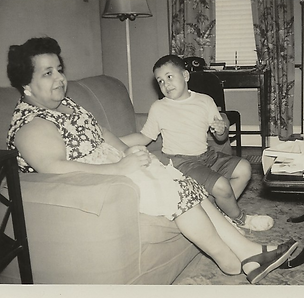Early life
1954-1965
William Henry Curry was born in 1954 to a lower-middle-class family in Pittsburgh. Musical talent can be traced to both sides of his family. His maternal grandfather helped organize an opera company and performed baritone in a production of Verdi’s Il Trovatore; his paternal grandmother won a scholarship to become an organ major at the prestigious New England Conservatory in 1915; Curry’s brother, Ralph, is a gifted cellist who has performed in the Cleveland Orchestra for over forty years. However, there was little opportunity for Curry or his brother to pursue music in their early childhood.
“We couldn’t afford a TV until I was five years old, … But we got everything we had to have and we were loved. Me and my little brother went to an all-Black elementary school, which was totally under-served. There were no music programs, no art programs—we were completely out there forgotten.” WHC

Curry and his mother, circa 1959

Curry and his brother, circa 1960
1963
Experiences
A pivotal moment in Curry’s early life occurred during a family trip to Virginia, when he noticed a segregated drinking fountain marked “colored” and asked his mother, “is the water in that fountain colored?” Her response did not placate his confusion. Curry recalls being outraged and questioning further. “This is so insulting. White people are actually in charge of this? How dare they? Why didn’t they handle this?”
Upon returning to class that fall, Curry refused to say “justice for all” when reciting the Pledge of Allegiance. An early civil rights activist, he was thrown out of school. He was allowed to return when he agreed to recite the Pledge, and did so employing a substitution suggested by his mother: “When you get to the ‘justice for all’ part, just curse.”
1965-1972
Young musician
Curry’s musical training began with the viola and clarinet when Eugene Reichenfeld donated instruments and offered lessons as part of a school program. Reichenfeld, also a conductor, helped instill in Curry an insatiable passion for music.
1970 was a landmark year for Curry’s musical development. Reichenfeld gave Curry, age 15, the opportunity to debut as a conductor. When Curry asked for lessons in conducting, his teacher refused, saying "You are either born a conductor or you are not." Curry recalls, “After my first rehearsal as a conductor, I couldn’t get the smile off of my face. I was so happy."
This same year, Curry began composing, heavily influenced by his curiosity for history, literature, and a variety of music including Broadway, Hollywood, Motown, and the Beatles. He authored music for a Shakespearean theater group at the Carnegie Library in Pittsburgh, and won first prize in the Carnegie-Mellon Composition Contest.

Debut as a conductor, 1970

Beginning career
1972-1977
Curry became a conducting major at the Oberlin Conservatory in 1972, where he studied with the late Robert Baustain. Curry left Oberlin three years later to audition as Assistant Conductor for the Richmond Chamber Orchestra. The Board of Directors denied him the title, claiming that his predecessor, also an Oberlin student, hadn’t worked out. Curry later discovered the Board of Directors was furious that an African American had been hired.
At the end of Curry’s first season in Richmond, the Music Director scheduled to conduct the grand finale—Beethoven’s Ninth Symphony—fell ill the night before. The Board of Directors were forced to give Curry the title of Assistant Conductor and asked him to conduct that evening’s concert with no rehearsal. Curry and orchestra’s performance received a standing ovation and outstanding reviews.
Baltimore debut, with singers, 1977
Conducting globally
1977-1996
Curry served as the Resident Conductor with the Baltimore Symphony starting in 1977. The following year he debuted with the National Symphony Orchestra at the Kennedy Center. He went on to conduct the St. Paul Chamber Orchestra (1983) and Indianapolis Symphony (1983-88). Curry won first prize in the 1988 Leopold Stokowski Conducting Competition and made a debut performance in Carnegie Hall.
The next decade of Curry’s career saw him debut with a multitude of groups across the United States and globally. Here you can find an interactive map highlighting each of those performances.
In between international performances, Curry served as Resident Conductor of the New Orleans Symphony (1990-91) and Interim Associate Conductor of the Atlanta Symphony Orchestra (1995-6) before taking the position of Resident Conductor of the North Carolina Symphony, which he held from 1996 to 2016.

Outside after Carnegie Hall debut, 1988

World Premiere of Eulogy for a Dream with speaker Avery Brooks, 1999
Acclaimed composer
1999-Present
On June 13, 1999, the Indianapolis Symphony premièred Eulogy for a Dream, a piece Curry composed for speaker and orchestra using excerpts from the writings and speeches of Dr. Martin Luther King, Jr. This piece garnered tremendous success and has become his most frequently performed composition. Eulogy for a Dream was broadcast nationally in January 2000 on the National Public Radio program Performance Today.
Curry currently serves as Music Director and Conductor of the Durham Symphony, which he was appointed to in 2009.